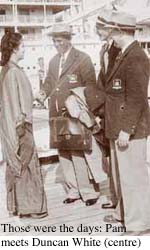
17th September 2000
News/Comment|
Editorial/Opinion| Business| Sports|
Sports Plus| Mirror Magazine

Go Duncan, go,go…
 It's
as if she has just come back from watching the Games. Her eyes alight with
the memo- ries, her voice full of excitement, she recalls that moment.
"My friend, Shirani Weerasinghe and I were sitting near the finish-line
and Duncan White was passing right in front of us. We were hysterical and
shouting out his name, and.." -she holds her breath, "for a second he was
distracted and looked around! He nearly lost his silver medal!" Though
I always knew that White did not lose his silver medal, we both fall back
in our seats with immense relief.
It's
as if she has just come back from watching the Games. Her eyes alight with
the memo- ries, her voice full of excitement, she recalls that moment.
"My friend, Shirani Weerasinghe and I were sitting near the finish-line
and Duncan White was passing right in front of us. We were hysterical and
shouting out his name, and.." -she holds her breath, "for a second he was
distracted and looked around! He nearly lost his silver medal!" Though
I always knew that White did not lose his silver medal, we both fall back
in our seats with immense relief.
Pam Fernando of golfing fame, is one of the legions of local sports fans now glued to their television sets watching the thrilling moments at the 2000 Sydney Olympics. But unlike many, her experience of the Olympics is not limited to newspaper reports and television coverage. She has 'been there', at the first Olympics after World War 2- in England,1948. We Sri Lankans remember the '48 Games with reverence because that's when Duncan White wrote his name in the history books, winning a silver medal for Ceylon in the men's 400 metres hurdles. Imagine being there, when history was made.
 Just
how did she get to be so lucky? Pam Fernando, then Pam de Vos, was one
of many who sailed to England after the war. "I wanted to do nursing while
in England, but after a while I realized nursing was not for me." So she
accepted a post at Ceylon House, the Ceylonese consulate in England. There
she found her job description rather vast, with more tasks being added
on, once Sri Lanka joined the Commonwealth. "I found myself doing all sorts
of things, from furnishing the House to placing Sri Lankan students, on
top of being a secretary-cum-receptionist."
Just
how did she get to be so lucky? Pam Fernando, then Pam de Vos, was one
of many who sailed to England after the war. "I wanted to do nursing while
in England, but after a while I realized nursing was not for me." So she
accepted a post at Ceylon House, the Ceylonese consulate in England. There
she found her job description rather vast, with more tasks being added
on, once Sri Lanka joined the Commonwealth. "I found myself doing all sorts
of things, from furnishing the House to placing Sri Lankan students, on
top of being a secretary-cum-receptionist."
So it was only natural that she had to be the one to welcome the Sri Lankan team for the 1948 Olympics. "When I met them they asked me what I would like. I said I would like a ticket for the Games," she recalled. And that's how she found herself jumping up and down on a seat at Wembley Stadium while White blazed past the finish line to win the silver for Ceylon. And Pam was just a bubbly 22-year-old.
It seems that it wasn't only watching the Games that made the experience so memorable. On their way to the stadium she and her friend June Somasundara had their taste of celebrity. "We were walking towards the Wembley Stadium, and there were all these athletes, distinguished people who were also walking along, but people -good looking fellows, I remember, wanted our autographs! You see, at the time in England, dark skin and the sari was such a novelty that people were fascinated. They used to call me 'coconut princess'," she smiles. "They wanted autographs from the two of us, but we were panicking because we both had non-Sinhalese names. So June signed as Lilawathi Somasundara, and I changed my name to something of the sort too!"
The Olympics over 50 years ago was a vastly different experience from the hi-tech event it is today. "Today the training for Olympic athletes begins 10 years before the Games. That wasn't being done those days. Because of the war you couldn't train athletes like that," Pam recalls. "Also, the Games were at a much more amateur level. Today there are only two sports which are conducted at both amateur and professional levels; golf and cycling."
The years have not stripped her of even one morsel of her enthusiasm for sports, and she is as keen about the Olympics now as she was at 22. But she laments the problems like the use of drugs that have invaded the Games, the one event that brings the world together every four years. "You can't really look up to the Games as you did before, " she says.








![]()
Front Page| News/Comment| Editorial/Opinion| Plus| Business| Sports| Sports Plus| Mirror Magazine
Please send your comments and suggestions on this web site to

